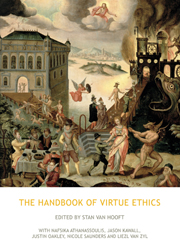Book contents
- Frontmatter
- Contents
- Acknowledgements
- 1 Introduction
- PART I NORMATIVE THEORY
- PART II TYPES OF VIRTUES
- 14 What virtues are there?
- 15 Intellectual virtues
- 16 Virtue, reason and wisdom
- 17 Integrity
- 18 The ends of courage
- 19 Wit
- 20 Humility, Kantian style
- 21 Love, sex and relationships
- 22 Forgiveness and forgivingness
- 23 The virtue of justice revisited
- 24 The virtues of African ethics
- 25 Classical Confucianism as virtue ethics
- 26 Ethics and virtue in classical Indian thinking
- 27 Mindfulness, non-attachment and other Buddhist virtues
- 28 Virtue in Islam
- PART III APPLIED ETHICS
- PART IV THE PSYCHOLOGY OF VIRTUE
- Contributors
- References
- Index
28 - Virtue in Islam
from PART II - TYPES OF VIRTUES
- Frontmatter
- Contents
- Acknowledgements
- 1 Introduction
- PART I NORMATIVE THEORY
- PART II TYPES OF VIRTUES
- 14 What virtues are there?
- 15 Intellectual virtues
- 16 Virtue, reason and wisdom
- 17 Integrity
- 18 The ends of courage
- 19 Wit
- 20 Humility, Kantian style
- 21 Love, sex and relationships
- 22 Forgiveness and forgivingness
- 23 The virtue of justice revisited
- 24 The virtues of African ethics
- 25 Classical Confucianism as virtue ethics
- 26 Ethics and virtue in classical Indian thinking
- 27 Mindfulness, non-attachment and other Buddhist virtues
- 28 Virtue in Islam
- PART III APPLIED ETHICS
- PART IV THE PSYCHOLOGY OF VIRTUE
- Contributors
- References
- Index
Summary
Modern studies on Islamic ethics, especially in European languages, have been very limited in number or scope (Fakhry 1991: ix). Recently, for example, an article about Islamic ethics begins with the following statement:
Let us begin by stating that “Islamic ethics” as a discipline does not exist. A huge amount of material on ethics is scattered throughout the pages of tafsir (Qur'anic exegesis), Kalam (scholastic theology) and Fiqh (jurisprudence) as well as in the work of Sufis (mystics). There is a growing realisation that Muslims should give due attention to this subject so that it can be studied as a discipline.
(Siddiqui 1997: 423)I would argue that the presumption that “Islamic ethics as a discipline does not exist” is both true and false. It is true because, in the contemporary academic world not only Western academic scholars, but also Muslim scholars themselves seem to overlook the ethics. On the other hand, it is false because there does exist an Islamic tradition of ethics as a discipline initiated by Muslim philosophers in the past. The translation of the Nicomachean Ethics by Ishaq Ibn Hunayn (died 911) marked a turning point in the history of philosophical ethics in Islam: it brought Arabic philosophers into contact with the greatest systematic treatise of Greek ethics, as interpreted in particular by Porphyry (Fakhry 1991: 78).
A study in Islamic moral theory has to begin with the Qur'an, which is the foundational text for Muslims.
- Type
- Chapter
- Information
- The Handbook of Virtue Ethics , pp. 318 - 326Publisher: Acumen PublishingPrint publication year: 2013

